Will Catholics be able to preserve their Church? Lessons for the Orthodox
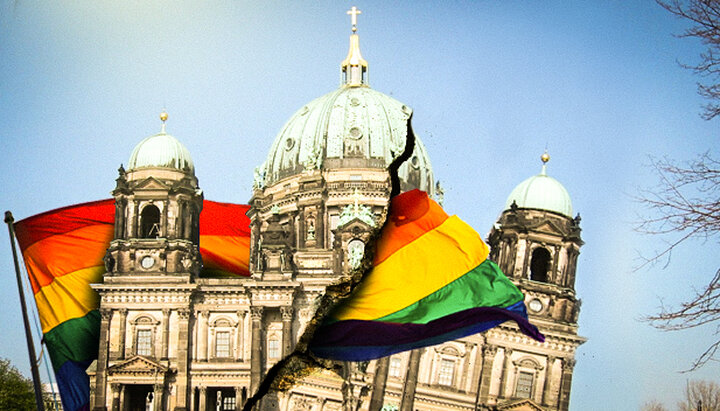
A German cardinal called the Synodal Way decisions on LGBT and female priesthood blasphemous. Will the RCC be able to avoid a schism? What conclusions should we draw?
On February 11, 2022, the National Catholic Register published an interview with Cardinal Gerhard Müller, the prefect emeritus of the Congregation of the Doctrine of the Faith (CDF), shortly after the scandalous “Synodal Way”’s decisions to legalize the LGBT and female priesthood in the Catholic Church. G. Müller stated the faithful Catholics are today facing a period of persecution, tribulation and “psychological terror” from their liberal-minded brethren who promote ideas that are incompatible with traditional church teaching. Even a superficial look at the situation suggests that Muller is absolutely right. But are his words not the voice of one crying in the wilderness? After all, Pope Francis has made more than one "sympathetic" statement on LGBT issues. Will Catholics be able to stop the RCC from sliding into the abyss of liberal ideas, or is a schism the only prospect for the Vatican? And what conclusions should we, Orthodox Christians, draw from this situation?
Decisions of the "Synodal Way" in Germany
The “Synodal Way” is a movement that brings together bishops and laity in Germany, created to discuss issues of power, sexual morality, the priesthood and the role of women. The Synodal Assembly consists of bishops, 69 laymen, members of the Central Committee of German Catholics and representatives of other parts of the German Catholic Church. The next Synodal Way meeting is to be held in Frankfurt on September 8-10, the “Synodal Way” will finally end in the spring of 2023, and in October 2023 the Vatican will have to accept or reject the “Synodal Way”’s proposals.
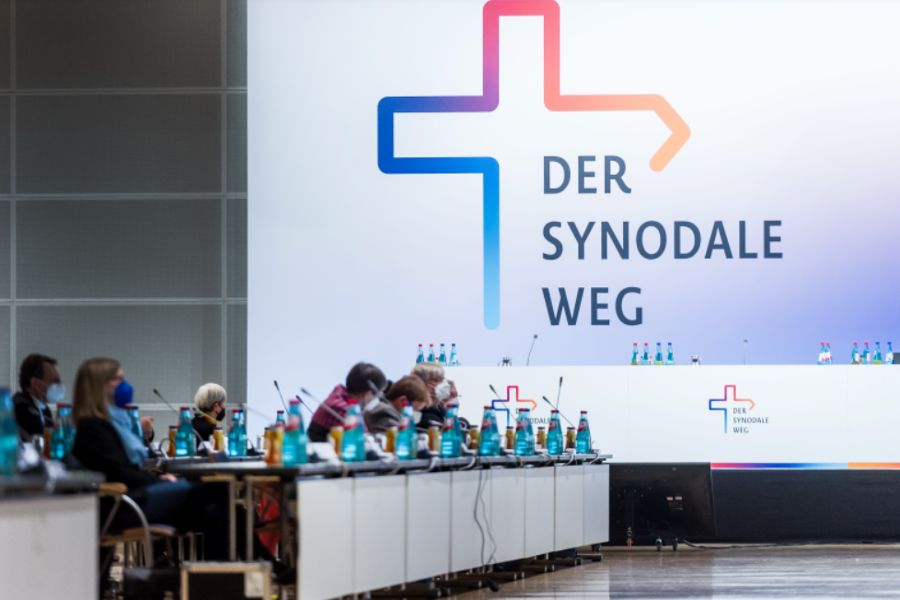
On February 5, 2022, at their last meeting, the Synodal Way members approved the text of the document "Blessing Celebrations for Couples Who Love Each Other" with 161 votes in favour, 34 against, and 11 abstentions. In percentage terms, this is 78% for and 16% against the document. The margin is very large. By an even wider margin, the participants supported further discussion of the text of the document "Magisterial reassessment of homosexuality”. These documents demand that the Catholic Church reconsider its attitude toward sodomy and recognize same-sex marriages.
78 percent of the “Synod Way” participants voted in favor of legalizing LGBT people in the Catholic Church..
Before the vote, Cardinal Jean-Claude Hollerich, Archbishop of Luxembourg, who is head of The Commission of the Bishops' Conferences of the European Union and also the General Representative of the “Synodal Way” at the final Vatican Council, gave an interview to the German Catholic agency KNA.
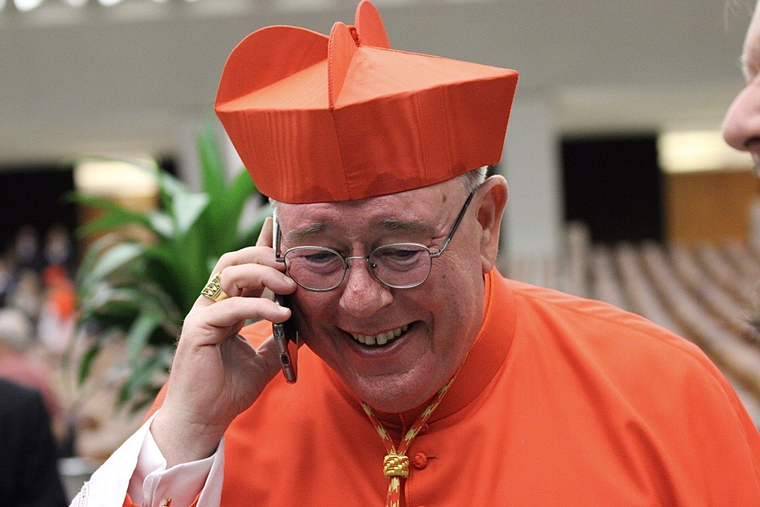
Hollerich stated that there are homosexual priests and laity in his archdiocese and that it would be un-Christian to expel them. To the question: “How do you bend the teaching of the Church that homosexuality is a sin?”, he replied: “I think it’s wrong. I also believe that we are thinking ahead in terms of doctrine (on the sinfulness of homosexuality – Ed.). The way the pope has expressed himself in the past can lead to a change in doctrine. Therefore, I believe that the sociological-scientific foundation of this teaching is no longer true... There is no homosexuality in the New Testament at all. Only homosexual acts that were to some extent pagan cult acts are discussed. It was, of course, forbidden I think it's time we make a fundamental revision of the doctrine."
This answer should be considered in more detail. It shows how sodomy, which the Holy Scriptures call an abomination, can be declared permissible in terms of Catholic religious morality. In florid scholastic language, it will be said that homosexuality is not sinful in itself but only in the context of pagan worship. Accordingly, if it is practised outside of this context, then it is permissible.
However, let us return to the “Synodal Way”. In addition to the demand for a revision of the Catholic Church’s attitude towards homosexuality, the following reforms were approved at the meeting:
- the introduction of the female priesthood (so far in the rank of deacon);
- the abolition of compulsory celibacy for priests;
- increasing the role of the laity in the election of new bishops.
The Second Vatican Council as a forerunner of the "Synodal Way"
In an interview with the National Catholic Register, Cardinal Gerhard Müller claimed that the participants in the "Synodal Way" who adopted the scandalous documents are part of a larger movement against the Second Vatican Council (1962-1965). But in fact, the opposite is true: it was the Second Vatican Council that opened wide the door to all kinds of liberal ideas, proclaiming the principle of aggiornamento, that is, the renewal of Christian life and the adaptation of church discipline to the needs and customs of the times.
The main idea of this Council was to make the Catholic Church more open to society, more receptive to the trends of the times, more understandable and attractive to modern people. The proponents of this approach believed that in a "modernized" Church, Christian preaching would become more effective. However, time has shown that this is not the case. No matter how many times you simplify the services, no matter how many times you soften the moral requirements, people still leave the Catholic Church, and the further away they go, the faster. And now the Catholic Church, "modernized" in the 1960s, needs to be "adapted" to the 21st-century society, which has moved on since the Council.
The same liberal Cardinal Hollerich says: "The change in the civilization that we are witnessing today is the greatest change since the invention of the wheel. The Church has always kept up with the times and has always adapted. But it has always taken much longer. Today we must be faster. Otherwise, we will lose contact and we will no longer be understood."
Well, Hollerich's words are the programmatic declaration of modern Catholics who seek to "adapt" to a society that otherwise "will not understand". And this position was affirmed just after the Second Vatican Council.
The Church has always kept up with the times and has always adapted. But it has always taken much longer. Today we must be faster. Otherwise, we will lose contact and we will no longer be understood.
Cardinal Jean-Claude Hollerich
For example, the Second Vatican Council's Declaration Dignitatis humanae adopted there declares that the most important place in man's search for truth is occupied by his conscience, by which he perceives and acknowledges the dictates of the divine law: “In all his activity a man is bound to follow his conscience in order that he may come to God.” But what is the conscience of our old man? Has it been so clouded by sin that it can no longer be considered a true guide on man's path to God? After all, it is safe to say that the vast majority of LGBT people, paedophiles, and so on act in perfect harmony with their conscience. And the Declaration Dignitatis humanae justifies this. But should one not be guided on the path of salvation by the Gospel and Divine commandments? We see that between "adaptation to the times" and the Gospel, modern Catholics are increasingly choosing the former path.
The decline of Christianity in Europe
If the Catholic Church really wants to “keep up with the times”, then it will soon have to abandon not only traditional morality, but also worship, temples, and so on. To put it simply, it will simply self-destruct. Modern Europe is being rapidly de-Christianized, the current era being declared post-Christian. People stop going to temples and being guided by religious prescriptions in their daily lives. The scale of the closure and destruction of temples is amazing. According to the French publication Les Observateurs, approximately ten thousand churches and bell towers in France may soon be destroyed simply as unnecessary.
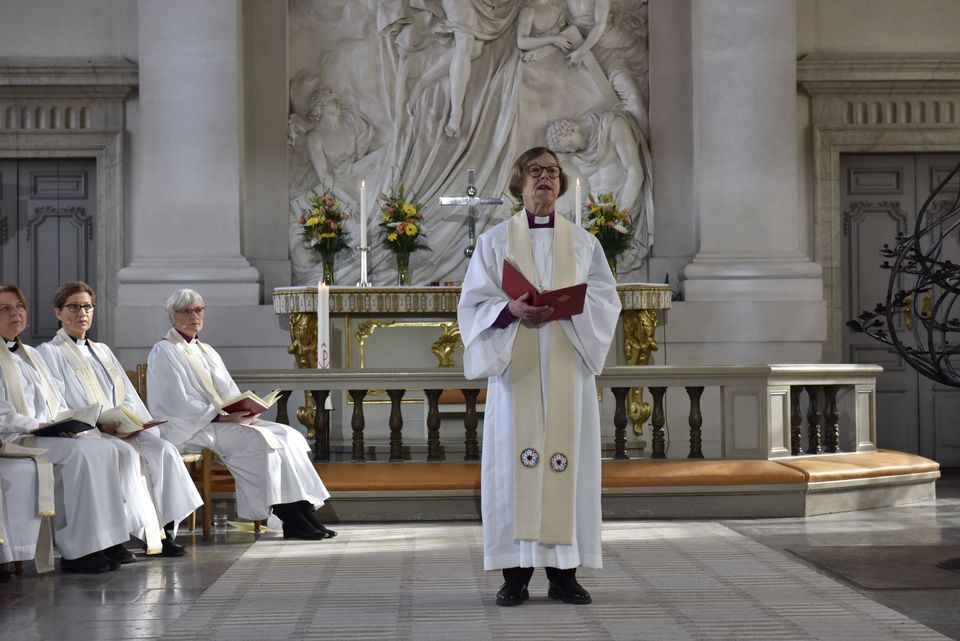
In Germany, 515 Catholic churches have been closed in the past decade and another 700 are scheduled to close. In the Netherlands, two-thirds of Catholic churches will have been closed by 2025. The same is happening in other European countries.
Between "adaptation to the times" and the Gospel, today's Catholics are increasingly choosing the former path.
In doing so, Catholics are simply struggling to keep up with the times and the needs of society. And this leads to the fact that LGBT and gender ideology are deeply rooted in them. What awaits them next can be seen in Protestant denominations, where open lesbians have long become “bishops” there.

International documents, such as the Istanbul Declaration or the Biarritz Partnership, which actually make states combat traditional morality, do not cause any significant opposition from Catholics and Protestants.
Will the Catholic Church face a schism?
Cardinal Gerhard Müller is by no means the only Catholic hierarch who opposes the recognition of same-sex marriages and other changes in Catholic moral teaching. Cardinal Rainer Maria Woelki of Cologne and Bishop Rudolf Voderholzer of Regensburg are well known for their conservative stance, but apart of them, a significant number of Catholic believers and clerics do not approve of the reforms to Catholicism proposed by the "Synodal Way". They are criticised by liberals and even ostracised. In the words of Cardinal Müller, it is "a period of tribulation and psychological terror" for faithful Catholics.
As for Pope Francis' position, he is clearly sympathetic to supporters of LGBT ideology. In 2013, just after taking the throne, he said, "If it (homosexuality – Ed.) is a human condition, but he has a good will and seeks God – who are we to judge?" In 2018, he received homosexual Juan Carlos Cruz at the Vatican and said: "Juan Carlos, that you are gay does not matter. God made you like this and loves you like this and I don’t care. The pope loves you like this. You have to be happy with who you are." These are far from the only approving statements Pope Francis has made about LGBT people. But on the other hand, the Pope has not stated that the Catholic Church’s teaching on this issue could be revised. And when in 2021 the Congregation of the Doctrine of the Faith passed a ruling banning the blessing of same-sex couples, the Pope signed the document.
It is very likely that when the “Synodal Way” is due to hold a council at the Vatican, parties for and against changing the Catholic Church's moral teachings will finally take shape. Their positions will be irreconcilable, and a compromise will be impossible. What future awaits the Catholics?
The first option is a full-fledged schism with the appearance on the scene of such a character as the "anti-pope" and the parties anathematizing their opponents. The likelihood of this scenario is low. The second option is a semi-schism. It is very probable and can be traced back to the experience of the creation after the Second Vatican Council of the Priestly Fraternity of Saint Pius X, which brought together traditionalists who did not agree with the decisions of the Council. The brotherhood was founded in 1970 by the French archbishop Marcel Lefebvre and is part of the Catholic Church, although its canonical status is uncertain and its relationship with the Vatican is very complicated. It is quite possible that if the Catholic conservatives are defeated by the liberals in 2023, they will simply join this fraternity.
A person must come to the Church to change themselves, to cast off the old man, and not to change the Church for themselves.
The third option is coexistence. The official doctrine will not change, but the "blessing" of same-sex couples, the female priesthood and other innovations will simply be done, and the Vatican will remain silent about this. It will pretend that it is just local custom. This is already happening in some places.
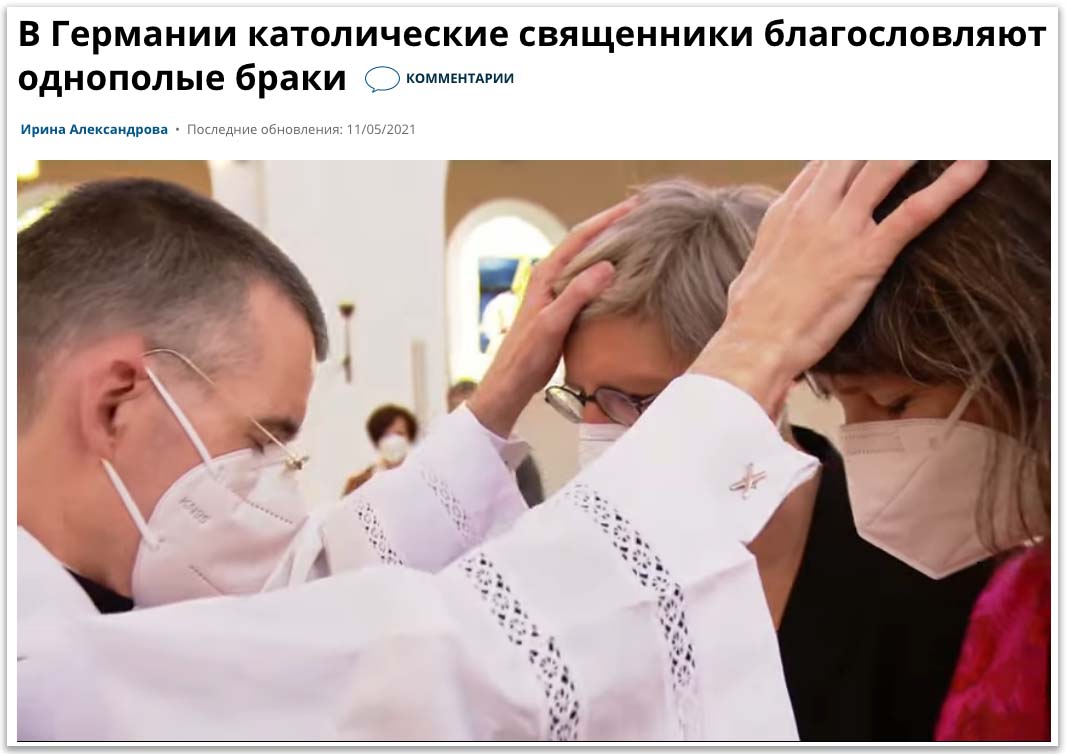
It is clear that whichever way things go, a large segment of the Catholic Church's clergy and faithful already accept the LGBT ideology and do not consider homosexuality a sin. Can they still be called Christians? The question is rhetorical.
Lessons for Orthodox Christians
History tells us that all Western ideas reach us only belatedly. Therefore, there is no doubt that if nothing changes, tomorrow the same ideas will be propagated in our country as in the West. Already now representatives of both the OCU and the UGCC are making statements in the spirit that the Church must meet the needs of society and adapt its teaching and practice to the needs of the people.
As long as nationalism is popular among Ukrainians, the Uniates and the top of the OCU talk about the "equal angelism" of the Heavenly Hundred, the "Paschal sacrifice of Euromaidan" and that "heroes do not die". But if tomorrow we are told that traditional teaching is outdated and needs to be changed in favour of LGBT people, the denominations mentioned will have to react. Now, they will tear an epitrachelion on their chest and shout that this will never happen, but you can't change the system. If a denomination sees its raison d'être in meeting the demands of society, it will not be able to say "no" to that society just because its demands have become different.
Now we are told that the Church should be open to society and the people. And it is right. But the Church should never follow society's lead. Therefore, we, Orthodox Christians, should look at what is going on with the Catholics, Protestants and schismatics and make conclusions. It is necessary to carefully preserve the Church and the Gospel teaching from any attempts to "improve" or "modernize" them. A person must come to the Church to change themselves, to cast off the old man, and not to change the Church for themselves. This should be the inner conviction of every Orthodox Christian.
But in external relations, it is necessary to fight against the imposition of LGBT, gender ideology and everything else that is contrary to the biblical understanding of the world. We in Ukraine are now resisting attempts to impose the Istanbul Convention and other international agreements that deny traditional values. Believers should actively support this struggle, because if we allow LGBT ideology to penetrate into our society, then it will soon come into the Church. Proven by Protestants and Catholics.











